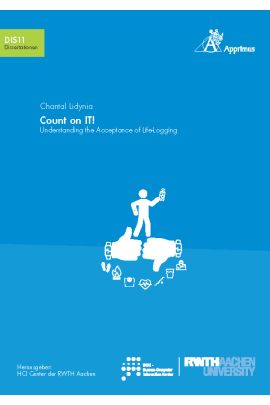Digitalization has brought many advantages as to what is possible with little effort. Nowadays, many jobs require the use of computers and/or desks, leading to many hours spent sitting down. Furthermore, easily available and high-caloric foods are consumed in amounts the sedentary lifestyle cannot compensate. Possible repercussions can include weight gain, musculoskeletal impairments but also psychological problems, e.g., depression. The risks of physical inactivity are well-known, as are the possible benefits of sufficient physical activity and a healthy lifestyle.
Life-logging is the practice of recording data throughout (daily) life. With the ubiquity of mobile computing, there is an app for tracking almost anything. Concerning data such as steps, distance traveled, location, heart rate, caloric expenditure, and the like, there are also specialized devices, so-called wearables, that help to keep an eye on daily accumulated results. These technologies can also give reminders and induce more physical activities, e.g., by offering (virtual) badges for completing pre-defined goals.
However, the use of life-logging technologies is still low in Germany. To find out why, studies were conducted to survey perceived barriers and benefits (potential) users see concerning life-logging technologies.
The results are a starting point to generate a user-centered approach so that not only individuals but also healthcare systems and societies as a whole might benefit. To do so, concerns and needs of (future) users have to be revealed and adequately addressed.
| Autor | Lidynia, Chantal |
|---|---|
| Lieferzeit | 3-4 Tage |
| Gewicht | 0.308 kg |
| Erscheinungsdatum | 14.06.2019 |
Dissertationen
Count in IT! - Understanding the Acceptance of Life-Logging
Kurzbeschreibung
The benefits of sufficient activity and a balanced diet are well documented. Yet a trend emerges of spending too much time seated in front of a computer, be it at work or home. Life-logging technologies can help to keep track of, such as steps or calories. They can also give reminders and induce more physical activity, e.g., by awarding (virtual) badges. The present thesis investigates perceived barriers and benefits to the use of life-logging to understand the acceptance of these technologies.

